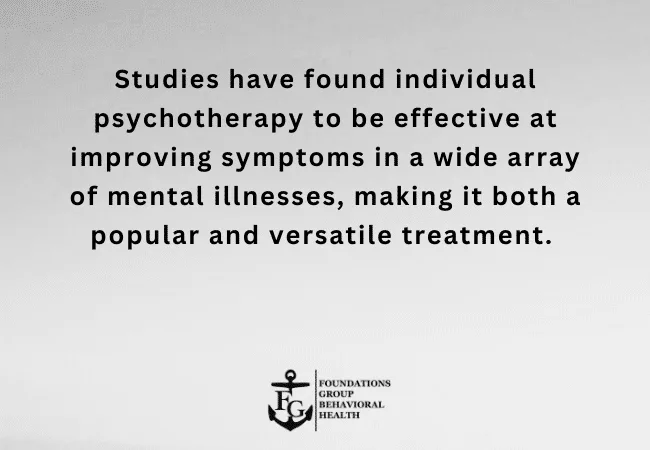Mental health therapy is a vital tool for managing conditions such as anxiety, depression, trauma, and co-occurring disorders. However, with so many different types of therapy available, choosing the right approach can feel overwhelming.
At Foundations Group Behavioral Health, we provide a range of evidence-based Mental Health Treatment Programs in Massachusetts, including Psychiatric Day Treatment, Half-Day Treatment, and Outpatient Mental Health Programs. Whether you’re seeking therapy for stress management, emotional regulation, or long-term mental health care, understanding the different types of therapy can help you make an informed decision about your treatment.
This guide explores various types of mental health therapy, their benefits, and which may be right for your needs.
Understanding Mental Health Therapy
Mental health therapy is designed to help individuals:
- Develop healthy coping strategies
- Address past trauma and unresolved emotions
- Improve self-awareness and emotional regulation
- Build better relationships and communication skills
- Manage symptoms of anxiety, depression, PTSD, and co-occurring disorders
Therapy can be delivered in various settings, including:
- Individual therapy (one-on-one with a therapist)
- Group therapy (support and shared learning with peers)
- Family therapy (improving family dynamics and communication)
At Foundations Group Behavioral Health, we incorporate a variety of therapeutic approaches in our treatment programs to ensure personalized, effective care.
1. Cognitive Behavioral Therapy (CBT)
Best For:
- Anxiety disorders (generalized anxiety disorder, social anxiety)
- Depression and mood disorders
- Obsessive-compulsive disorder (OCD)
- Post-Traumatic Stress Disorder (PTSD)
CBT is one of the most widely used and evidence-based forms of therapy. It focuses on identifying negative thought patterns and replacing them with healthier, more realistic thoughts.
How It Works:
- Helps individuals recognize automatic negative thoughts
- Teaches coping skills for managing distress
- Encourages behavioral changes to improve emotional well-being
At Foundations Group Behavioral Health, we integrate CBT into our Anxiety Treatment Program and Depressive Disorder Treatment Program in Massachusetts.
2. Dialectical Behavior Therapy (DBT)
Best For:
- Borderline Personality Disorder (BPD)
- Severe anxiety and depression
- Self-harm behaviors and suicidal ideation
- Emotional dysregulation
DBT is a specialized form of therapy that helps individuals manage intense emotions and build resilience. It teaches four core skills:
- Mindfulness: Staying present in the moment
- Distress Tolerance: Handling difficult emotions without reacting impulsively
- Emotional Regulation: Learning how to manage strong feelings
- Interpersonal Effectiveness: Improving relationships and communication
DBT is an essential part of our Psychiatric Day Treatment Program in Massachusetts for individuals who need intensive emotional regulation support.
3. Trauma-Focused Therapy (EMDR & CPT)
Best For:
- PTSD and trauma-related disorders
- Survivors of abuse, violence, or severe distress
- First responders, veterans, and individuals with chronic stress
Eye Movement Desensitization and Reprocessing (EMDR)
- Uses guided eye movements to help the brain reprocess traumatic memories.
- Reduces the emotional impact of past trauma.
Cognitive Processing Therapy (CPT)
- Helps individuals reframe their thoughts about trauma.
- Focuses on changing unhelpful beliefs about oneself and the world.
At Foundations Group Behavioral Health, we provide Trauma Disorder Treatment Programs in Massachusetts, integrating EMDR and CPT for comprehensive trauma recovery.
4. Psychodynamic Therapy
Best For:
- Unresolved childhood trauma
- Relationship and attachment issues
- Chronic depression and anxiety
Psychodynamic therapy explores deep-seated emotional patterns and subconscious conflicts that may be influencing current behaviors.
How It Works:
- Focuses on self-reflection and emotional insight
- Examines past experiences and their impact on present emotions
- Encourages healthy relationship patterns and emotional growth
This therapy is beneficial in long-term treatment plans, such as our Outpatient Mental Health Program in Massachusetts.
5. Exposure Therapy
Best For:
- Phobias (fear of heights, flying, social situations, etc.)
- Obsessive-compulsive disorder (OCD)
- PTSD and severe anxiety disorders
Exposure therapy gradually helps individuals face their fears in a controlled setting. By exposing individuals to anxiety-provoking situations in a safe way, they learn to reduce fear responses over time.
At Foundations Group Behavioral Health, we incorporate Exposure Therapy into our Anxiety Treatment Programs in Massachusetts to help individuals regain control over their fears.

6. Acceptance and Commitment Therapy (ACT)
Best For:
- Chronic anxiety and depression
- Stress-related disorders
- Individuals struggling with negative self-perception
ACT encourages individuals to accept difficult emotions rather than fight them. It combines mindfulness techniques with values-based actions to help individuals lead a fulfilling, purpose-driven life.
ACT is beneficial in our Half-Day Treatment and Psychiatric Day Treatment Programs in Massachusetts, helping individuals develop long-term resilience.
7. Family Therapy
Best For:
- Families struggling with communication issues
- Loved ones of individuals with mental health conditions
- Children, teens, and parents dealing with family-related stress
Family therapy focuses on improving family dynamics, communication, and conflict resolution. Sessions may include:
- Addressing relationship stressors
- Learning healthy communication strategies
- Supporting loved ones in their mental health treatment journey
Family therapy is a key part of our Co-Occurring Disorder Treatment Program and Trauma Disorder Treatment Program in Massachusetts.
8. Group Therapy
Best For:
- Individuals needing peer support and shared experiences
- People struggling with anxiety, depression, or trauma
- Those looking to improve interpersonal skills
Group therapy provides a supportive environment where individuals:
- Share experiences and reduce feelings of isolation
- Learn from peers facing similar challenges
- Develop social skills in a safe setting
At Foundations Group Behavioral Health, we offer Group Therapy as part of our Psychiatric Day Treatment and Outpatient Mental Health Programs.
Which Therapy is Right for You?
The right therapy depends on:
- Your specific mental health concerns (anxiety, depression, trauma, etc.)
- Your treatment goals (short-term symptom relief or long-term healing)
- Your comfort level with individual vs. group settings
At Foundations Group Behavioral Health, our team will assess your needs and recommend the best therapy approach. Whether you require Psychiatric Day Treatment, Half-Day Treatment, or Outpatient Mental Health Services, we create customized treatment plans to ensure the best care possible.
Final Thoughts
Seeking therapy is a courageous step toward healing and self-improvement. Whether you’re managing anxiety, depression, trauma, or a co-occurring disorder, the right therapy can make a significant impact on your well-being.
At Foundations Group Behavioral Health, we provide comprehensive Mental Health Treatment Programs in Massachusetts, including:
If you’re unsure which therapy is right for you, call us today at 888.685.9730. Our experts will guide you toward the best treatment path for your needs. Your mental wellness journey starts here!
FAQ on Mental Health Therapy
What are the most common types of mental health therapy?
The most widely used therapy approaches include:
- Cognitive Behavioral Therapy (CBT) – Focuses on changing negative thought patterns.
- Dialectical Behavior Therapy (DBT) – Helps regulate emotions and manage distress.
- Trauma-Focused Therapy (EMDR, CPT) – Designed for PTSD and trauma recovery.
- Psychodynamic Therapy – Explores past experiences that affect present emotions.
- Group Therapy – Provides peer support and shared experiences.
How do I know which therapy is right for me?
The right therapy depends on:
- Your specific mental health concerns (anxiety, depression, PTSD, co-occurring disorders).
- Your preferred therapy format (individual, group, family therapy).
- The level of care you need (Psychiatric Day Treatment, Half-Day Treatment, or Outpatient Therapy).
A professional assessment can help determine the best therapy approach for your needs.
What is Cognitive Behavioral Therapy (CBT) used for?
CBT is effective for:
- Anxiety and panic disorders
- Depression and mood disorders
- Obsessive-compulsive disorder (OCD)
- Post-Traumatic Stress Disorder (PTSD)
It helps individuals recognize negative thinking patterns and develop healthier coping mechanisms.
What is Dialectical Behavior Therapy (DBT), and who benefits from it?
DBT is designed for individuals struggling with:
- Borderline Personality Disorder (BPD)
- Severe depression or anxiety
- Self-harm behaviors or suicidal thoughts
- Emotional dysregulation
DBT teaches mindfulness, distress tolerance, emotional regulation, and interpersonal effectiveness.
How does trauma-focused therapy help with PTSD?
Trauma therapy techniques like EMDR (Eye Movement Desensitization and Reprocessing) and CPT (Cognitive Processing Therapy) help individuals:
- Process past trauma in a safe environment.
- Reduce the emotional intensity of distressing memories.
- Develop healthier beliefs about past traumatic experiences.
These therapies are included in Trauma Disorder Treatment Programs in Massachusetts.
What is the difference between individual therapy and group therapy?
- Individual therapy provides one-on-one sessions with a therapist, focusing on personal challenges and goals.
- Group therapy allows individuals to share experiences, gain peer support, and learn from others facing similar struggles.
Both types of therapy are effective, and many treatment programs integrate both for comprehensive support.
Can family therapy help with mental health recovery?
Yes. Family therapy improves communication, resolves conflicts, and strengthens relationships between individuals in treatment and their loved ones. It is particularly beneficial in:








